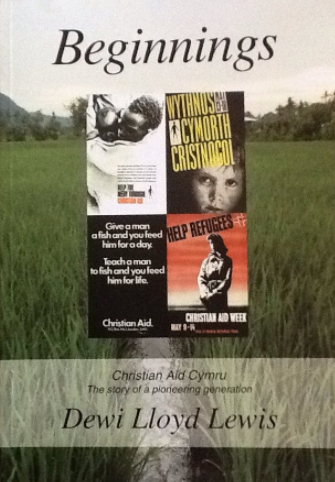Beginnings - Christian Aid Cymru
The story of Christian Aid through the lens of Wales' experience, a tale of which Welsh and English readers alike can be proud
 Beginnings
Beginnings
Christian Aid Cymru - The story of a pioneering generation
By Dewi Lloyd Lewis
Tom Defis, Cymorth Cristnogol (Christian Aid)
ISBN 978-0-9929887-1-5
Reviewed by Fiona Liddell
Against the backdrop of the UN Freedom from Hunger Campaign, Inter Church Aid, Biafra and the wider work of Christian Aid, it documents the way in which the organisation took root and blossomed in Wales. It is a public recognition of the contribution of many named people, places and churches to Christian Aid's work from the 1957 to 1972.
It is also in parts an autobiographical story. Dewi Lloyd Lewis was the first member of Christian Aid's staff in Wales, with responsibility for nurturing and coordinating the work there. Work and home life were very much intertwined. The first Christian Aid office was within the family home, with Dewi's wife Fiona providing office administration. The enormity of the task and the passion with which it was embraced meant this was more a way of life than a job.
One strand of the story, and of Dewi's personal mission, was the internal campaign for Welsh language resources, including Christian Aid Week materials, and for a measure of autonomy in the ordering of Christian Aid's affairs in Wales. In time the case was made, too, for additional staff to work in Wales. Thanks to the tenacity and vision of this faithful pioneer, Christian Aid is today one of the UK charities that has most successfully developed an authentic Welsh ethos and this has earned it a well deserved credibility and respect.
2016 saw the 50 year anniversary of the Aberfan disaster, which resulted in the death of 144 people, including 116 primary school children, when an avalanche of coal waste engulfed a farm, a terrace of houses and a primary school. The tragedy is recalled in one brief chapter including the role played by Christian Aid in coordinating pastoral support for those affected. The same year saw widespread famine in five states in India. The point is powerfully made that human suffering and hardship are not confined by geography, and that our response should be the same wherever it occurs.
As a one time Area Secretary for Christian Aid in one quarter of Greater London, I can barely imagine where one would begin in building up the work in an area the size of Wales, and without the benefits of modern digital forms of communication. But in the 1960s, no less than now, careful stewardship of staff time and resources was important.
Dewi describes his own rule of thumb for assessing the return on the 'investment' of his travels: he would expect a round trip to visit supporters in North Wales, which might cost £40 in fuel, to yield at least 10 times that amount, or £450, in Christian Aid Week income. Then, as now, Christian Aid was morally accountable to its donors, as well as to its beneficiaries.
'Beginnings' tells a tale, of which Welsh and English readers alike can be proud, of mobilising community response for the relief of poverty and global justice. It is a story that has not ended yet.
Dr Fiona Liddell is an elder of the United Reformed Church and Presbyterian Church of Wales in South Wales. She currently works for the Wales Council for Voluntary Action, and was from 1984-1991 the South West London Area Secretary for Christian Aid
Baptist Times, 03/02/2017